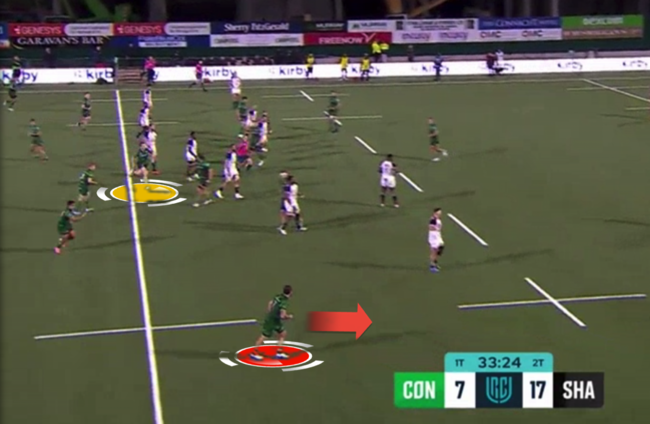COMING INTO THIS 2024/25 campaign, club players would have had a reminder from their coaches and analysts that there had been a notable change to the offside law.
World Rugby closed the ‘Dupont Law’ in July by permanently changing the lawbook.
Antoine Dupont and France had led a clever tactic that took advantage of a loophole regarding players being offside after a team-mate had kicked the ball. If you want a reminder of what France and others were doing, read this piece. It created some farcical situations.
From the July Tests onwards, that loophole was shut for good following a successful trial in Super Rugby.
In essence, this means a defender can’t be put onside when the opposition receiver of a kick runs five metres or passes the ball, as was the case before. As importantly, World Rugby also specified that offside defenders “must make an attempt to retreat” and get onside.
The idea was to create space for counter-attacks and reduce extended ‘kick tennis.’
Recent evidence underlines that this change has been successful. Let’s take an example from Leicester’s Premiership clash with Bath.
The passage starts with Bath out-half Finn Russell missing touch from a penalty.
Leicester fullback Freddie Steward fields the ball and responds by launching a massive kick down into Bath’s 22.
This sends Russell racing back to gather the ball as Leicester wing Ollie Hassell-Collins hares upfield in pursuit of Steward’s kick, bringing all his team-mates onside as he does so.
Having had to work back, Russell doesn’t have much of an option other than to kick back out of his 22. With all but one of Russell’s team-mates ahead of him, he really needs to find touch but he misses again.
And now this is where we see the change in offside law coming into effect.
With Steward also having chased his own kick, it’s Leicester scrum-half Jack van Poortvliet who catches Russell’s clearance.
Under the old law, the Leicester man would have had potential tacklers much closer to him.
The Bath players marked in red below would have been able to hold their ground exactly where they were at this moment.
The three players in yellow would have had to get behind their own 10-metre line but they would then also have been entitled to hold their ground there, being 10 metres downfield from where van Poortvliet caught the ball.
If van Poortvliet had caught the ball and run five metres, all those Bath players would have been put onside and, therefore, been able to tackle him.
However, the law change means that now every one of these offside Bath players has to make an “effort to retreat” and get onside to avoid being penalised. They legally cannot “loiter” in an offside position.
As soon as Russell kicks, referee Craig Maxwell-Keys is roaring to the Bath players, “Retreat, keep retreating, keep retreating!”
Van Poortvliet understands and fully exploits the situation, accelerating into space as the Bath players retreat.
This is a new sight in rugby and exactly the kind of situation World Rugby wanted to create.
As has always been the case, Russell can bring team-mates onside by running upfield ahead of them but as we see below, he’s relatively slow to chase his kick.
Russell does bring a number of his team-mates onside but van Poortvliet is able to bypass many of the Bath players untouched.
By the time Bath make contact with him, it’s a panicked situation and tighthead prop Will Stuart is stretching to reach him, giving up penalty advantage for a high tackle.
Leicester keep playing at pace on top of Bath and two phases later, with the defence still reeling, it’s van Poortvliet who seals the deal by dummying and sniping through to score.
This try would not have been possible only a few months ago before the law changed.
Some of those Bath defenders upfield of Russell’s kick would have stood their ground and been able to tackle van Poortvliet after he had run five metres.
The fact that those players can no longer remain stationary and must make an effort to retreat is a big shift.
The consequences of failing to retreat can be severe, as Australia learned during their heavy Rugby Championship defeat to Argentina last month. With that game still in the balance, the Wallabies gave up an avoidable offside penalty.
Again, there’s an exchange of kicks as the Australians initially attempt a 50:22 through centre Hamish Stewart.
Argentina’s Santiago Carreras does an excellent job of turning back to field the ball, then he delivers a long kick down into Wallabies territory.
As soon as Carreras kicks, referee Pierre Brousset roars at the Argentina players in front of the kicker.
“Retreat, retreat… keeping moving!” shouts Brousset, looking directly at centre Santiago Chocobares upfield and we can see that the Pumas player does so, making an effort to bring himself back onside.
So play continues as the Wallabies look to deal with Carreras’ kick.
Fullback Andrew Kellaway scoops the ball up and passes infield to out-half Ben Donaldson, who kicks back at the Pumas.
And this is where the Wallabies err.
Again, Brousset immediately roars a warning after the kick.
“Gold, run back, retreat, retreat,” he shouts but Wallabies scrum-half Jake Gordon doesn’t do so.
Gordon stands still, holding his position upfield of Donaldson.
The two players closest to Gordon, wing Marika Koroibete and centre Len Ikitau, aren’t making an huge effort to retreat either, although they seem to take at least one step back downfield.
Gordon appears to have his hands up in an attempt to indicate he’s holding his ground, but that doesn’t suffice any more.
So as Argentina fullback Juan Cruz Mallía fields Donaldson’s kick and runs back at the Wallabies, we can see Brousset indicating the penalty advantage.
“Advantage, never moved back, number nine,” says Brousset and Gordon appears to be confused.
The advantage comes to nothing so Brousset blows his whistle and says, “Number nine, you have to move back.”
And then the damage of the offence hits home as Brousset tells Argentina captain Julián Montoya, “Captain, you’ve got the penalty here [pointing down to where Gordon held his position] or the scrum at the kick [pointing to where Donaldson kicked from].”
This relates to Law 10.4 which outlines sanctions for players being offside in front of a team-mate who has kicked the ball. The non-offending team can choose either a penalty at the place of infringement or a scrum where the offending team last played the ball.
The Pumas opt for the five-metre scrum. They win a scrum penalty at the first set-piece, decide to scrum again, then score a try off it.
With the conversion added, the Pumas suddenly open up clear space on the scoreboard with a 31-20 lead and they never look back from there.
There have been a few instances of teams and players adjusting to this change in law early on in the URC season.
Take this example from Connacht’s win over the Sharks.
Wing Shane Jennings kicks for Connacht and referee Federico Vedovelli immediately starts shouting, “Retreat, retreat” to the Connacht players in front of Jennings.
We can see that most of them make an effort to do so, but Vedovelli penalises flanker Conor Oliver.
Oliver does initially retreat.
But then Oliver turns around and begins to move forward before Jennings [yellow below] has been able to bring him onside.
Vedovelli’s arm goes up for the penalty advantage.
“Advantage, seven [Oliver] never retreats,” says the referee.
The advantage goes nowhere and Vedovelli blows his whistle before addressing Oliver directly.
“Seven, never moving backwards, offside.”
While that’s not entirely true, with Oliver initially having retreated, the Connacht man did then advance before being brought onside. Oliver is probably unfortunate that Jennings slices his kick here, meaning it flies out towards where Oliver is positioned, bringing focus onto him, but it’s a lesson learned.
The Sharks opt for a shot at goal from inside their own half, with fullback Jordan Hendrikse hammering over the three points to extend their lead.
There was another interesting incident when Edinburgh were penalised against Leinster a week earlier.
After an exchange of kicks, Edinburgh clear the ball to touch.
Initially, the Edinburgh players upfield are retreating.
But as the ball finds touch, we can see that Edinburgh captain Jamie Ritchie begins to move forward even though he has not been brought onside.
Leinster fullback Jamie Osborne is taking a quick lineout to himself as Ritchie begins walking upfield.
As Osborne then decides to kick, Ritchie accelerates towards him looking for a blockdown.
Referee Andrea Piardi blows his whistle for a penalty against Edinburgh, telling Ritchie, “You need to retreat.”
Ritchie immediately appeals against the penalty, seemingly claiming that Piardi told the Edinburgh skipper he was OK to move forward.
“I was speaking to another one [player], sorry Jamie,” responds Piardi. “Offside, in front of the kicker, never retreats.”
Ritchie asks for further explanation.
“You were looking at me,” he says to Piardi. “I asked you ‘Are we good?’ and you said ‘Yes.’
“No,” responds Piardi, “I was speaking to another one.”
Leinster kick their penalty to touch and Piardi jogs after Ritchie.
“I’m sorry for the confusion, I wasn’t speaking to you,” says Piardi before Ritchie tries another avenue.
“He [Osborne] has moved five metres, so I can advance. It came back on the pitch,” says Ritchie.
“It’s the new rule,” says Piardi. “You need to retreat and be put back onside, even if we have a quick throw. It’s the new rule.”
It’s an instructive example as Piardi’s explanation underlines that the law change still applies even when there’s a quickly-taken lineout involved.
The closing of the old ‘Dupont Law’ loophole is an aspect of the game that referees have been asked to put additional focus on once again coming into the November Tests.
World Rugby are keen that match officials nail these decisions in the biggest games next month to ensure that coaches and players are no longer looking for shortcuts.
It’s understood that the onus will mostly be on offside players close to the kicking player, demanding that they make a clear effort to retreat.
While match officials may be more understanding of players on the opposite side of the pitch to the kick at least remaining stationary, the safest bet for anyone in front of the kicker is to retreat and get themselves onside as quickly as possible.
The Dupont Law is dead.






































Awesome analysis again Murray.
Very well explained to be fair